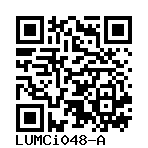LUMCi048CTRL-A, 48CTRL-A, 48CTRL-3
LUMCi048-A
General
Cell Line |
|
| hPSCreg name | LUMCi048-A |
| Cite as: | LUMCi048-A (RRID:CVCL_C1UF) |
| Alternative name(s) |
LUMCi048CTRL-A, 48CTRL-A, 48CTRL-3
|
| Cell line type | Human induced pluripotent stem cell (hiPSC) |
| Similar lines |
LUMCi048-B (48CTRL-B, LUMCi048CTRL-B, 48CTRL-6) LUMCi048-C (LUMCi048CTRL-C, 48CTRL-C, 48CTRL-8) |
| Last update | 1st March 2024 |
| User feedback | |
Provider |
|
| Generator | Leiden University Medical Center (LUMC) |
| Owner | Leiden University Medical Center (LUMC) |
| Distributors | |
| Derivation country | Netherlands |
External Databases |
|
| BioSamples | SAMEA12121561 |
| Cellosaurus | CVCL_C1UF |
| Wikidata | Q114311892 |
General Information |
|
| * Is the cell line readily obtainable for third parties? |
Yes Research use: allowed
Clinical use: not allowed
Commercial use: allowed
|
Donor Information
General Donor Information |
|
| Sex | female |
| Age of donor (at collection) | 60-64 |
| Ethnicity | Caucasian |
Phenotype and Disease related information (Donor) |
|
| Diseases | No disease was diagnosed.
|
Karyotyping (Donor) |
|
| Has the donor karyotype been analysed? |
Yes
46 XX
Karyotyping method:
Molecular karyotyping by SNP array
http:// |
Other Genotyping (Donor) |
|
| Is there genome-wide genotyping or functional data available? |
No
|
Donor Relations |
|
| Other cell lines of this donor | |
External Databases (Donor) |
|
| BioSamples | SAMEA12983518 |
Ethics
| Has informed consent been obtained from the donor of the embryo/tissue from which the pluripotent stem cells have been derived? | Yes |
| Was the consent voluntarily given? | Yes |
| Has the donor been informed that participation will not directly influence their personal treatment? | Yes |
| Can you provide us with a copy of the Donor Information Sheet provided to the donor? | Yes |
| Do you (Depositor/Provider) hold the original Donor Consent Form? | No |
| If you do not hold the Donor Consent Form, do you know who does? | Yes |
| Please indicate whether the data associated with the donated material has been pseudonymised or anonymised. | pseudonymised |
| Does consent explicitly allow the derivation of pluripotent stem cells? | Yes |
| Does consent prevent CELLS DERIVED FROM THE DONATED BIOSAMPLE from being made available to researchers anywhere in the world? | No |
| How may genetic information associated with the cell line be accessed? | Controlled Access |
| Will the donor expect to receive financial benefit, beyond reasonable expenses, in return for donating the biosample? | No |
| Has a favourable opinion been obtained from a research ethics committee, or other ethics review panel, in relation to the Research Protocol including the consent provisions? | Yes |
| Name of accrediting authority involved? | UMass Medical Center Memorial Campus Ethical committee |
| Approval number | CR00473248 |
| For generation of the cell line, who was the supplier of any recombined DNA vectors or commercial kits used? |
hIPSC Derivation
General |
|
| Source cell type |
A fibroblast of skin.; Skin fibroblasts specialized cells found in the dermis, the middle layer of the skin, where they play critical roles in maintaining skin health and functionality. Characterized by an elongated, spindle-like shape, skin fibroblasts are the principal active cells in the connective tissue of the skin. The primary function of skin fibroblasts is the maintenance and regeneration of the extracellular matrix, which provides structural and nutritional support for other skin cells, particularly keratinocytes and epithelial cells. These cells contribute to the production of collagen, elastin, and glycosaminoglycans - key proteins that maintain the elasticity, strength, and resilience of the skin. Through this function, skin fibroblasts help prevent skin aging and maintain tissue integrity, contributing to the skin's overall health and appearance.
In addition, skin fibroblasts are implicated in the skin's wound healing process. Following injury, fibroblasts migrate to the wound site where they start proliferating and laying down new connective tissue. They play a vital role in the repair, regeneration, and healing of the skin; in the final stages of wound healing, skin fibroblasts help contract the healing tissue to minimize scar formation. Furthermore, recent research highlights their role in the immune response, with some studies indicating that skin fibroblasts can react to, and have a role in dealing with, pathogen invasion.
(This extended description was generated by ChatGPT and reviewed by the CellGuide team, who added references, and by the CL editors, who approved it for inclusion in CL. It may contain information that applies only to some subtypes and species, and so should not be considered definitional.)
|
| Age of donor (at collection) | 60-64 |
Reprogramming method |
|
| Vector type | Non-integrating |
| Vector | Single‑Stranded RNA Replicon Vector |
| Is reprogramming vector detectable? |
Unknown |
Vector free reprogramming |
|
| Type of used vector free reprogramming factor(s) |
mRNA
|
Other |
|
| Derived under xeno-free conditions |
Unknown |
| Derived under GMP? |
Unknown |
| Available as clinical grade? |
Unknown |
Culture Conditions
| Surface coating | Matrigel/Geltrex |
| Feeder cells |
No |
| Passage method |
Enzyme-free cell dissociation
ReLeSR
|
| CO2 Concentration | 5 % |
| Medium |
mTeSR™ 1
|
Characterisation
Analysis of Undifferentiated Cells
| Marker | Expressed | Immunostaining | RT-PCR | Flow Cytometry | Enzymatic Assay | Expression Profiles |
| SSEA-4 |
Yes |
|
||||
| NANOG |
Yes |
|
||||
| POU5F1 (OCT-4) |
Yes |
|
Differentiation Potency
Genotyping
Karyotyping (Cell Line) |
|
| Has the cell line karyotype been analysed? |
Yes
46 XX
Karyotyping method:
Molecular karyotyping by SNP array
http:// |
Other Genotyping (Cell Line) |
|


Login to share your feedback, experiences or results with the research community.